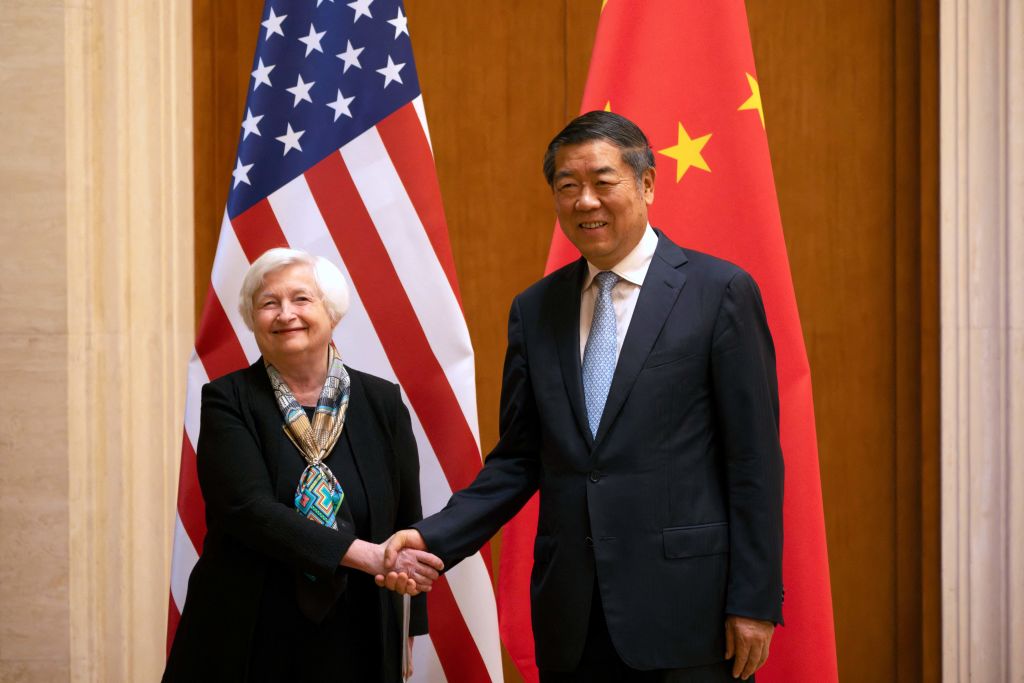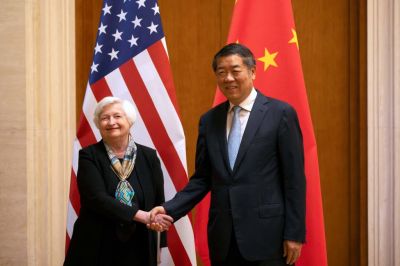Happy Monday! A Canadian court ruled last month that texting someone a 👍 emoji can, in certain circumstances, be construed as a legally binding contractual agreement.
The court also held that using the 😗 emoji legally makes you a weirdo.
Quick Hits: Today’s Top Stories
- The Bureau of Labor statistics reported Friday that U.S. employers added 209,000 jobs in June, fewer than expected and down from 306,000 in May. The unemployment rate fell slightly from 3.7 percent to 3.6 percent, with the labor force participation rate holding steady at 62.6 percent for the fourth consecutive month. Average hourly earnings—a measure the Federal Reserve is watching closely in its fight against inflation—rose 0.4 percent month-over-month in June, and 4.4 percent year-over-year. Those figures were 0.3 and 4.3 percent in May, respectively.
- Defense Department officials announced Friday the Pentagon will send Ukraine dual-purpose improved conventional munitions, also known as cluster munitions, as part of a larger security assistance package that also includes Stinger anti-aircraft systems, Bradley Infantry Fighting Vehicles, HIMARS munitions, and more. More than 100 countries have banned cluster munitions—which break apart into dozens of “bomblets” in the air to cover more area—due to the threat they can pose to civilians, but President Joe Biden defended the “difficult decision” to provide them to Ukraine, arguing the move was necessary to get Ukraine through a “transition period” while the U.S. ramps up production of standard ammunition. Russia has allegedly used cluster munitions extensively during its invasion.
- Five Ukrainian military commanders who were being held in Turkey after Russia released them in a prisoner exchange last year returned to Ukraine on Saturday with Ukrainian President Volodymyr Zelensky. The development angered the Kremlin, which labeled the commanders’ homecoming a violation of a deal brokered by Turkish President Recep Tayyip Erdoğan. The men, who surrendered in Mariupol in May 2022, were originally meant to stay in Turkey until the end of the war.
- A U.S. Central Command spokesman announced Sunday three MQ-9 Reaper drones had killed an Islamic State leader, Usamah al-Muhajir, in eastern Syria on Friday, just hours after the drones were harrassed by Russian fighter jets in Syrian airspace. The Pentagon said no civilians were killed in the attack, but they were assessing reports that a civilian was injured.
- Dutch Prime Minister Mark Rutte’s coalition government collapsed Friday during negotiations over asylum policy, as months-long talks broke down over a move by Rutte’s conservative party to make it harder for refugee families to reunite in the Netherlands. Rutte, the longest serving prime minister in Dutch history, has held the role since 2010 and will remain on as part of a caretaker government until new elections can be held—likely in November.
- The Iowa Republican Party’s State Central Committee voted unanimously on Saturday to hold their first-in-the-nation presidential primary caucuses on January 15, 2024—Martin Luther King Jr. Day, and the earliest start to the presidential nominating contest since 2012.
- Florida Gov. Ron DeSantis confirmed last week he will attend the first Republican presidential primary debate in August regardless of whether former President Donald Trump shows up. “I hope everybody who is eligible comes,” DeSantis told Fox News. “I think it is an important part of the process.” Officials from DeSantis’ aligned super PAC had previously signaled the Florida governor would not participate in the Milwaukee debate if the frontrunner skipped out on it.
- The shooter who killed 23 people, many of whom were Latino, at a Walmart in El Paso, Texas, in 2019 was sentenced to 90 consecutive life terms in prison Friday after pleading guilty to almost 50 federal hate crimes charges. The gunman will also stand trial in Texas after pleading not guilty to charges of capital murder, for which he could face the death penalty.
- Manhattan District Attorney Alvin Bragg indicted six businesspeople on Friday for allegedly using straw donors to contribute to New York City Mayor Eric Adams’ campaign during the 2021 mayoral election as part of a conspiracy to take advantage of the city’s donation-matching scheme and curry favor with Adams. Neither Adams nor anyone on his campaign team is accused of wrongdoing.
- Democratic Rep. Jamie Raskin of Maryland announced Friday he will not run for Senate to succeed the retiring Democratic Sen. Ben Cardin, opting instead to run for reelection in the House. Several other Democrats have already announced their intention to run for Cardin’s seat, including Prince George’s County Executive Angela Alsobrooks and U.S. Rep. David Trone.

In the Bible, God sent a rainbow as a promise to never flood the earth again. In Beijing, Treasury Secretary Janet Yellen arrived under a rainbow with a call for the United States and China not to flood the earth with economic destruction. “A decoupling of the world’s two largest economies would be destabilizing for the global economy, and it would be virtually impossible to undertake,” she said Friday. “We seek to diversify, not to decouple.”
Chinese officials seemed receptive to that message. “There is more to China-U.S. relations than just wind and rain,” said Chinese Premier Li Qiang. “We will surely see more rainbows.”
But diplomatic statements alone won’t be enough to clear the storm clouds that’ve been brewing between the world’s two largest economies. Days before Yellen’s arrival, for example, China announced new export controls on metals used in semiconductors and solar panels, retaliation for the United States’ limits on advanced chips and chips manufacturing sales to China. The countries’ economic relationship remains close—China is still the United States’ top trading partner—but heightened geopolitical tensions have American firms reconsidering their investments in China.
Worth Your Time
- For the Wall Street Journal, Ben Kesling details the U.S. military’s profound recruiting shortfalls. “The children of military families make up the majority of new recruits in the U.S. military. That pipeline is now under threat, which is bad news for the Pentagon’s already acute recruitment problems, as well as America’s military readiness,” he writes. “‘Influencers are not telling them to go into the military,’ said Adm. Mike Mullen, the former chairman of the Joint Chiefs of Staff, in an interview. ‘Moms and dads, uncles, coaches and pastors don’t see it as a good choice.’ After the patriotic boost to recruiting that followed 9/11, the U.S. military has endured 20 years of war in Iraq and Afghanistan with no decisive victories, scandals over shoddy military housing and healthcare, poor pay for lower ranks that forces many military families to turn to food stamps, and rising rates of post-traumatic stress disorder and suicide. At the same time, the labor market is the tightest it has been in decades, meaning plenty of other options exist for young people right out of school.”
- How should we square Chief Justice John Roberts’ seemingly contradictory rulings on race during the recently concluded Supreme Court term? Perhaps as a clever end-run around the court’s detractors, Jason Willick argues for the Washington Post. “The Supreme Court’s critics in recent years have charged that it faces a ‘legitimacy crisis’ because it is politically out of step with the country,” he writes. “This claim is meant to chasten the court’s conservative majority, and Roberts especially. But having raised the salience of the Supreme Court—and tied its legitimacy to its popularity—the institution’s critics find themselves in a vulnerable position when the court does something popular and consequential. Roberts appears to have done so on affirmative action, while avoiding a second race decision that could distract from the popular outcome. The Roberts court is under pressure from many sides. But at the end of another historic term, its constitutional turf seems well-defended. The court’s ideological antagonists will be left trying to attack the institution’s legitimacy under the guise of saving it.”
Presented Without Comment
Reason: If An Applicant Didn’t Check a Race Box, Harvard Would Assign a Race Anyway
Also Presented Without Comment
Wall Street Journal: D.C. Disciplinary Board Recommends Disbarring Rudy Giuliani
Toeing the Company Line
- In the newsletters: Nick basks in (🔒) the joy of anti-Trumpism, Jonah reflects on (🔒) an old column, Chris tackles the (🔒) debate over abortion policy happening on the right, the Uphill squad has the latest on GOP oversight plans and China policy, and the Dispatch Politics team checks in on Mike Pence and Nikki Haley’s presidential campaigns from Sioux City, Iowa, and North Conway, New Hampshire.
- On the podcasts: Jonah explores the work of Paul Cantor, the American founding, and the purpose of the Supreme Court.
- On the site over the weekend: Sean Keeley makes the case for conserving classic films in the age of streaming and Jessica Schurz explains Olivia Rodrigo’s appeal.
- On the site today: Audrey B. explains Biden’s newest student loan cancellation scheme and Renu Mukherjee breaks down misconceptions about public opinion on Supreme Court cases.
Let Us Know
Do you agree with Secretary Yellen that the United States’ goal should be to “diversify” rather than “decouple” its economy from China’s?









Please note that we at The Dispatch hold ourselves, our work, and our commenters to a higher standard than other places on the internet. We welcome comments that foster genuine debate or discussion—including comments critical of us or our work—but responses that include ad hominem attacks on fellow Dispatch members or are intended to stoke fear and anger may be moderated.
With your membership, you only have the ability to comment on The Morning Dispatch articles. Consider upgrading to join the conversation everywhere.